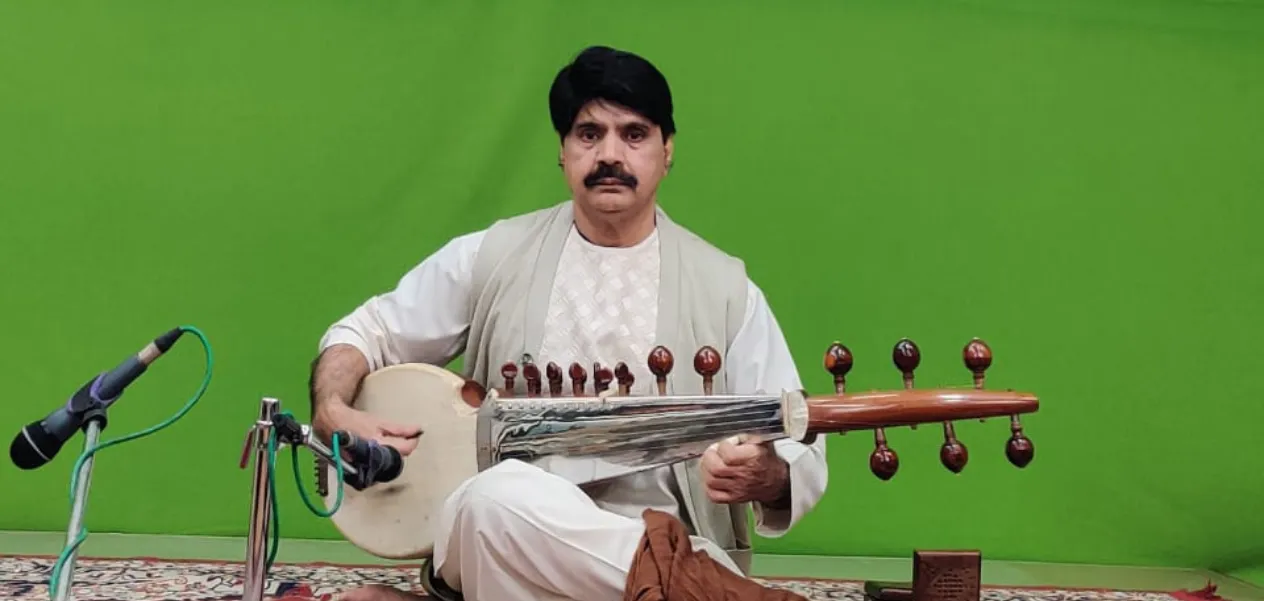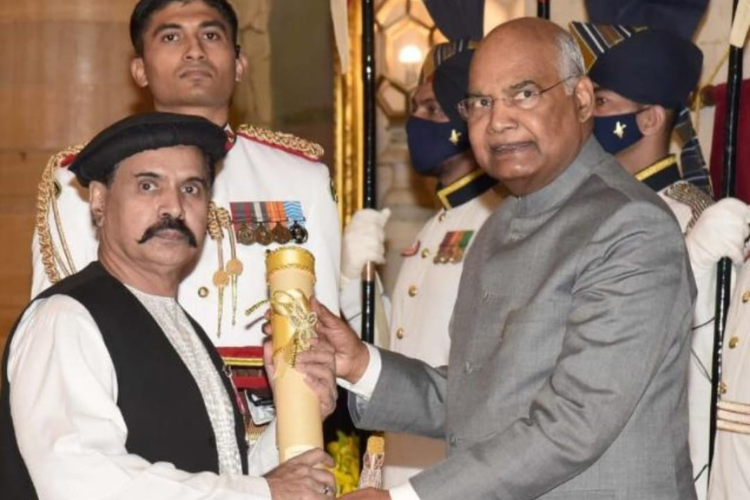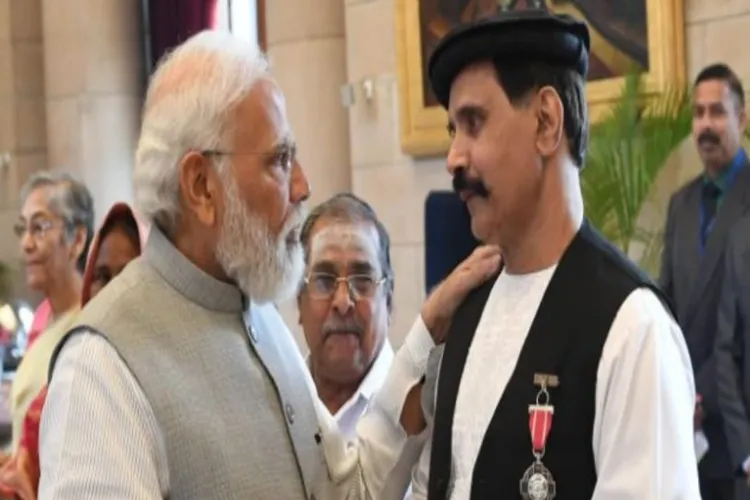
Tripti Nath/New Delhi
Ustad Gulfam Ahmed, a seventh generation musician celebrated globally for his mastery over the Rabab and the Sarod, is equally in demand for his Sufiana Kalams on Hindu Muslim unity.
Decorated with the Padma Shri in 2021 and numerous other awards, Gulfam says that Music knows neither Hindu nor Muslim. Music has its language. “Sangeet ki apni zubaan hai’’ (Music has its own language). Sangeet rooh ki riza hai. (Music is the food of the soul.) My performances are not in masjid and dargahs. Mostly are in mandirs and ashrams. When people appreciate musicians, they don’t look at their religion.’’
He popularized the Rabab in Punjab after playing it the first time at the Harballabh festival in 2005. His Sufiana kalams on Hindu- Muslim unity are a big hit. “One of my Sufi Kalams on Hindu-Muslim unity which I composed in 2006, is very popular. “ Mast Kalandar gaata jaye, Mast Kalandar. Allah teri Shan, Maula teri Shaan. Tu hi dil me, tu hi labh par, too he charon dham. Koi jai mandir me, Koi de azhaan. Koi jaye Girija me, Bole koi Satnam.’’

The verse ends with the lines. “Allah Allah kehta jaye, Kehta Jaye Ram. Prem ke do akhsar naa jaane, kaisa yeh ansan?’’
Four years back, he played the Rabab on popular demand in the Sankatmochan temple in Varanasi. “It was 4 a.m. and alongside the Aarti, I was playing the Rabab on the request by the audience.’’
Ustad Gulfam Ahmed’s contribution to the revival of the Rabab in Kirtans in the Golden Temple in Amritsar, after 200 years is historic. “This became possible after three of his Sikh students in Punjab played Rababs to the accompaniment of a Tabla at a Kirtan in the Golden Temple on March 30, 2007. Now, they play there every day. The tradition of the Rabab in Sikh religion dates back to Guru Nanak’s time when Mardana, one of his disciples used to play it. Now, the tradition is revived across Gurdwaras in the country after 131 years.’’
It was after his performance at the Harballabah festival that Raagis began approaching him to learn the Rabab. “Within a month, many Sikhs began coming to me. I also taught at Punjabi University, Patiala, Dukhnivaran Gurdwara and Gurudas University in Ludhiana. I have taught the Rabab to 65 students in Punjab. During my stay in Kabul from 2009 to 2014, I taught the Sarod, the Sitar, the Harmonium and the Rabab to 185 students at the Indian embassy. I went there on the invitation of the Indian Council of Cultural Relations.’’
Gulfam Ahmed has preserved the Sarod that his great grandfather, Sarkar Niyamatullah Khan played almost 200 years back.
.webp)
Ustad Gulfam Ahmed playing the Rabab
Born in 1956 in Bagrasi near Bulandshahar in Uttar Pradesh, Gulfam was raised in Delhi where his father, was a top grade staff artiste (Rabab and Sarod player) with All India Radio (AIR). He grew up in Fatehpuri, Khari Baoli in the walled city. The fourth among six siblings- four brothers and two sisters - Gulfam Ahmed began learning Sarod and Rabab from his father at the age of six and continued till his demise in 1967.
After that, his eldest brother, Mukhtar Ahmed who was also A Grade artiste with AIR, took him under his wings. Unfortunately, he also died in 1994. “My family fell on bad days and it became difficult for me to continue my studies. I lost my mother in 1969 but I did not give up my Riyaz.. I would also travel to Lucknow to learn from my cousin Ilyas Khan, a Professor in Bhatkhande College. He had taught Sitar to Raj Kapoor.’’
Gulfam said that when his father died, he was studying in Class IV government school in the walled city. “ I could not continue studies. Don’t ask how much I had to struggle. For almost seven years, I did odd jobs like working as a salesman in a clothes shop and a shoe shop in Ballimaran and assisted my brother in embroidery in a unit in East Delhi. I had no choice as I would otherwise go hungry. At that time, the rupee had value and eight annas were enough to fill one’s stomach. Salan would cost four annas (twenty five paisa) and a tandoori roti one anna. Some shopkeepers would paid Rs 80 while others would pay Rs 100 per month,' he recalls.
“However, it is exciting. That was also Life and this is also life. I have also been hosted many times by my Qatari diplomat friend in New York’s Revolving Restaurant, one of the most expensive restaurants in the world. Between 1991 and 1996. I was invited to perform Sarod during music festivals on the birthday of Swami Sivananda’s disciple, Swami Viswadeva, during two and a half months tour of Canada, Europe and U.S. In 1991, I began my New Year in New York, on the the invitation of the former Ambassador of Qatar to India, who wanted to learn Sarod from me. But the Iraq war started and he could barely learn the Sarod for eight hours in eight months. I returned to India after eight months.’’
Ustad Gulfam Ahmed says that he has been to all countries except China and West Indies. He prefers to play in India.
He distinctly remembers his maiden performance with his father in 1963 in Gurdaspur, Punjab , when he was eight years old,“ It was a distinguished gathering and I remember playing the Rabab before Prithvi Raj Kapoor who learnt the Sitar from my father.’’

PM Modi asking Gulfam Ahmed about the fate of Rabab in Afghanistan in Taliban rule
Ustad Gulfam Ahmad also teaches students in his house in east Delhi. He departed from family tradition in 2006 when his youngest daughter Hajra, now married in Afghanistan, wanted to learn the Rabab from him. Three young girls in the 11-22 age group from his family are among his disciples today. “They use the Hindustani Rabab and the Afghani Rabab. The Hindustani Rabab, also known as the Durpati, has six strings. The Rabab originally came from Afghanistan. It is also played in Kashmir. I play both kinds of Rababs. My Rabab comes from Kabul."
Gulfam Ahmed’s grand daughter, Zena Khan (who can be seen singing with him in the video in this text) is happy that he has created a different kind of Tanpura. Zena says, “This is a big message to the young generation that he is breaking from tradition. He has also gifted me a Sarod. He also writes lyrics, sings and cooks very well.’’
Interestingly Gulfam has his way of checking the passion of a person who comes to learn music from him. ‘’I have knowledge of numerology. So, I ask them their date of birth before I agree to teach them.’’
Talking of his family heritage Gulfam says, “My great grandfather Sarkar Niyamutallah Khan paid a little over one lakh silver coins to Mian Tansen’s great grandfather Basat Khan, to learn from him for six years in his house. My great grandfather lived in Afghanistan and would keep visiting India. Niyamutallah Khan was invited to perform when Queen Victoria visited Delhi. It was my paternal grandfather, Karamatullah Khan who composed Raghupati Raghav Raja Ram...in Allahabad 100 years back.’’
He practices for six hours everyday. “When is honoured with the Padma Shri, people begin judge you and see if you are worthy of the honour. At a concert in a school in Chandigarh some months back, I overheard a Tabla player ask another’ Inko kis baat ka Padma Shri mila hai? (What has he got the Padma Shri for? My disciple, a Tabla player told me what they were saying. I told him, “ Hume khud hi nahi malum.’ (I don’t know). After my performance ended, one of them was holding my shoes and the other was carrying my instrument. On Diwali, before I performed at the Durgiana Mandir in Amritsar, the organiser asked for my recording but after my performance, the same man desceibed me as a ‘Hira’ ( a diamond).
Ustad Gulfam Ahmed has three daughters. While two are in Delhi, one is married in Kabul. “We have relatives in Kanadahar, Jalalabad, Mazar-e-Sharif. When I was honoured with the Padma Shri and met Modi ji, he wanted to know the fate of the Rabab in the Taliban regime.’’
Gulfam says that the social media has played a positive role in promoting the arts.
ALSO READ: Indian Muslim women have a stronger voice today: Zeenat Shaukat Ali
On March 6, he performed in Bhubaneshwar at the invitation of the Parichay Foundation. He says that anybody fond of music is soft-hearted.
